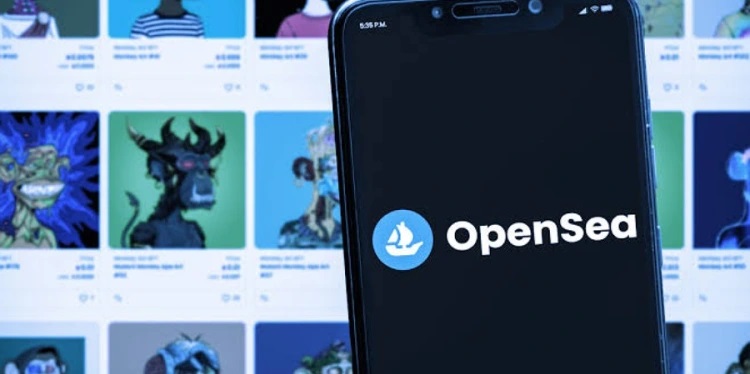OpenSea Partners With MoonPay For Fiat Card NFT Purchases

The partnership between OpenSea, the leading NFT marketplace, partner with MoonPay for fiat NFT Purchases, a crypto payment solutions provider, allows users to purchase NFTs using credit/debit cards, Apple Pay, and Google Pay, bypassing the need to acquire cryptocurrency first. This has significant implications for the NFT market and intersects with the broader crypto ecosystem, including speculative assets like $DOG (a Bitcoin-based Runes token teased for listing by Kraken). Below, I explore these implications and how they relate to the divide in the crypto community, as seen with $DOG.
By enabling fiat payments, OpenSea’s integration with MoonPay simplifies the NFT purchasing process for non-crypto natives, who previously needed to navigate crypto exchanges and wallets. Users can now buy NFTs directly with Visa, MasterCard, American Express, Apple Pay, or Google Pay, with transactions processed on-chain. This move broadens OpenSea’s user base, potentially onboarding millions who lack crypto knowledge, as MoonPay’s CEO Ivan Soto-Wright noted, aiming to “unlock ownership and onboard the world to Web3.” This could increase NFT trading volume, which hit $5 billion in January 2022.
Similar to how Kraken’s potential $DOG listing could make Bitcoin Runes more accessible, OpenSea’s fiat integration reduces friction for speculative assets. Both initiatives aim to attract mainstream users, but $DOG’s volatility as a meme coin contrasts with NFTs’ focus on unique digital assets. MoonPay’s NFT Checkout service, launched in January 2022, allows instant NFT purchases without requiring users to leave OpenSea’s platform or pre-fund a wallet with crypto. Users pay a 3.5% processing fee (minimum $3.99), with gas fees for blockchain transactions.
Register for Tekedia Mini-MBA edition 17 (June 9 – Sept 6, 2025) today for early bird discounts. Do annual for access to Blucera.com.
Tekedia AI in Business Masterclass opens registrations.
Join Tekedia Capital Syndicate and co-invest in great global startups.
Register to become a better CEO or Director with Tekedia CEO & Director Program.
Kraken’s $DOG listing could similarly simplify access to Bitcoin-based tokens, but unlike NFTs, $DOG lacks intrinsic utility, relying on community hype. OpenSea’s fiat integration is more user-friendly for tangible assets like digital art, while $DOG’s appeal is speculative, potentially amplifying price swings. OpenSea’s fiat payments could reduce the NFT market’s dependence on crypto price fluctuations (e.g., ETH rose 12.4% in March, making NFTs pricier). This stabilizes NFT pricing for fiat users, potentially boosting sales.
$DOG’s price, tied to Bitcoin’s blockchain, is highly volatile (e.g., 30% surge post-Kraken futures listing, then -23.9% in a week). A Kraken spot listing could mirror OpenSea’s goal of decoupling speculative assets from crypto volatility by increasing liquidity, but meme coins remain riskier than NFTs. The NFT space faces issues like plagiarism, wash trading, and money laundering, and fiat payments could attract stricter regulations to protect investors. MoonPay’s KYC requirements (e.g., identity verification for purchases over $7,500) aim to mitigate risks.
Kraken’s regulatory challenges (e.g., SEC lawsuit in 2023) highlight similar risks for $DOG. Both OpenSea and Kraken must navigate compliance, but $DOG’s decentralized, community-driven nature may complicate oversight compared to NFTs’ clearer ownership records. OpenSea’s move follows similar integrations by competitors like Nifty Gateway and Coinbase NFT (partnered with Mastercard). This pressures other platforms to adopt fiat payments to remain competitive.
Kraken’s potential $DOG listing positions it as a pioneer among Tier 1 exchanges for Runes tokens, akin to OpenSea’s early adoption of fiat for NFTs. However, $DOG faces competition from other meme coins, and its success depends on community momentum rather than established utility like NFTs. The OpenSea-MoonPay partnership, like Kraken’s $DOG listing tease, amplifies ideological and practical divides in the crypto space, reflecting tensions between accessibility, decentralization, and speculation.
Crypto purists, especially Bitcoin maximalists, argue that fiat integrations (like OpenSea’s) and speculative tokens (like $DOG) dilute the decentralized ethos of blockchain. They prioritize crypto-native transactions and view fiat on-ramps as centralizing forces that invite regulation. Supporters, including OpenSea and $DOG communities, see fiat payments and accessible tokens as critical for mass adoption. X posts (e.g., @CryptoGorillaYT) praise OpenSea’s fiat checkout as a “key step toward onboarding the next wave of collectors,” mirroring $DOG enthusiasts’ view of its listing as expanding Bitcoin’s utility.
OpenSea’s fiat integration fuels speculative NFT purchases, as users can buy instantly without crypto knowledge. Similarly, $DOG’s listing could attract traders chasing short-term gains, as seen in its 30% pump post-futures listing. NFT collectors and $DOG’s “DOG Army” prioritize community and long-term value. OpenSea users may invest in art or utility-driven NFTs, while $DOG holders see it as Bitcoin’s “mascot” for onboarding users, despite its volatility.
Some dismiss OpenSea’s fiat payments as inflating an already speculative NFT market, prone to rug pulls and hacks (e.g., OpenSea’s 2022 phishing attacks). Similarly, $DOG skeptics view it as a hype-driven meme coin with no lasting value. OpenSea’s partnership is celebrated for making NFTs accessible (62% positive sentiment on X), while $DOG supporters see its Kraken listing as validating Bitcoin Runes’ potential.
OpenSea’s partnership with MoonPay, enabling fiat payments for NFTs, lowers barriers, boosts accessibility, and could stabilize NFT pricing, but it invites regulatory scrutiny and fees (3.5% minimum $3.99). Similarly, Kraken’s potential $DOG listing could drive liquidity and validate Runes, but its meme coin volatility poses risks. Both initiatives bridge crypto to mainstream audiences, yet they deepen divides between purists and adoption advocates, centralized platforms and decentralization purists, and speculators and long-term holders.

